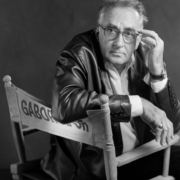From the HBT Archives: Rabbi Abraham L. Feinberg
By Michael Cole
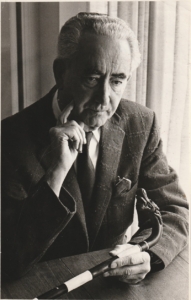
Rabbi Feinberg with the cane presented to him by President Ho Chi Minh of North Vietnam
Abraham L. Feinberg was born on September 16, 1899. It was Eruv Yom Kippur. Some of us remember our celebrating the rabbi’s birthday at Children’s Services on Yom Kippur afternoon. He would joke that, as a youngster, he never had a birthday cake!
I remember my parents taking me to my first adult services on the High Holy Days. On Kol Nidre, the services began with the lights in the sanctuary being dimmed. The rabbi entered from the side of the bimah, and the Torah scrolls were removed from the ark. Rabbi Feinberg ascended to the open ark and, facing it, in a beautiful lyric tenor voice, intoned the Kol Nidre chant. It was very dramatic.
But then, everything the rabbi did was done with a dramatic flair, including leaving the rabbinate. He did this in 1930, at New York’s prestigious Temple Israel, where he was the young assistant rabbi and heir apparent to the senior rabbi. “Organized religion is a deserted lighthouse; the tides of human energy beat on other shores,” the rabbi said in his farewell sermon before removing his robe, walking off the bimah and taking a seat in the pews.
Rabbi Feinberg’s leaving the rabbinate made news around the world. (In Toronto, Rabbi Eisendrath devoted a sermon to it, which, alas, has been lost.)
The entertainment world beckoned, and Abraham Feinberg transformed into Anthony Frome, “poet prince of the airwaves,” and a career as a Broadway singer with his own network radio show and his own fan club or ‘fellowship’ dedicated to racial and religious brotherhood.
However, in 1935, with the rise of Hitler, Anthony Frome gave up his show business career and returned to being Rabbi Abraham Feinberg and the spiritual leader of a small, very modest congregation, Mount Neboh, in Manhattan. (It was while at that synagogue that Rabbi Feinberg made a trip to Toronto to be the guest speaker at a communal Brotherhood Hanukkah rally.) In November, 1943, After a stint as rabbi in Denver, Colorado, Abraham L. Feinberg became the spiritual leader of Holy Blossom Temple, succeeding (and at the suggestion of) Maurice Eisendrath, who left to become the leader of the Union of American Hebrew Congregations.
During his eighteen-year stay at Holy Blossom, Rabbi Feinberg was involved in numerous controversies, beginning soon after his arrival in Toronto, when he spoke out against the teaching of religion in the public schools (a measure brought in by the Ontario government in 1944). The rabbi went so far as to inveigh against the singing of Christmas carols in school, earning him the wrath not only of Christians, but also many Jews, including some Orthodox rabbis.
Rabbi Feinberg was loud in his protests of racial and religious discrimination, the arms race, and, especially after his retirement, the war in Vietnam. He earned the appellation ‘the red rabbi’ from his detractors.
Rabbi Feinberg’s contributions to Holy Blossom were immense. He established the late (8:25) Friday evening service, replacing the flagship Sunday morning service. These late Shabbat services (followed by an oneg Shabbat) were hugely popular, often attracting upwards of 300 people. He also introduced the daily afternoon service. He brought back the position of cantor as a central figure of our worship services. He encouraged the study of Hebrew and the celebration of bar and, later, bat mitzvah. The rabbi, together with Heinz Warschauer (who also arrived in 1943), made Holy Blossom Religious School a model for synagogue schools across the continent. Significantly, Rabbi Feinberg was a lifelong Zionist, and he made Israel a central part of Holy Blossom’s life.
I remember Rabbi Feinberg as a fiery, riveting preacher. In person, he could be charming and funny, but also at times irascible and not one to suffer fools gladly.
Rabbi Feinberg retired from Holy Blossom in 1961, to become our first rabbi emeritus. At a Friday night service, the Abraham window was dedicated to “Rabbi Abraham L Feinberg, “intrepid champion of justice and peace.”
The rabbi’s life after retirement was as dramatic as it was before. In 1967, Rabbi Feinberg, together with three other clergymen, traveled to Hanoi and met with the North Vietnamese leader, Ho Chi Minh, in a bid to promote peace. In the same year, he visited John Lennon and Yoko Ono in their Montreal bed-in, attracting much publicity.
Rabbi Feinberg’s wife, Ruth, died in 1971. The rabbi moved to San Francisco and subsequently to Reno, Nevada, to be with his son, Jonathan. In San Francisco, he became ‘rabbi in residence’ at a very unconventional church. And in both cities, he resumed his radio career (but not as Anthony Frome) with a weekly show that focused on seniors and ‘Grey Lib’. He even sported a t-shirt with the message “Even Dirty Old Men Need Love.”
Rabbi Feinberg died on October 5, 1986. It was the second day of Rosh Hashanah. In his obituary in The Canadian Jewish News, Rabbi Plaut said of his predecessor: “He was born on the eve of Yom Kippur and died on Rosh Hashanah. Between these two poles he lived his life, a meteor streaking across our horizon, leaving us with challenges and memories, and the emptiness of his absence.”
Our Archives Committee has arranged an exhibit on Rabbi Feinberg, and one on Heinz Warschauer, in the Atrium display cases, which we invite you to visit the next time you are in the Temple.

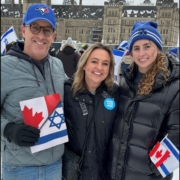
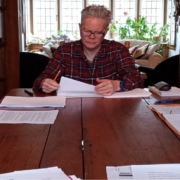
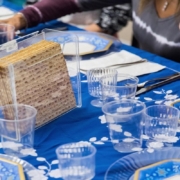
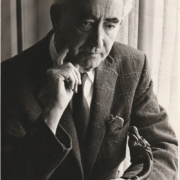

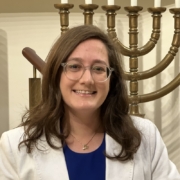
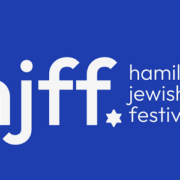
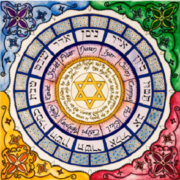
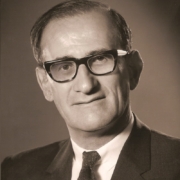
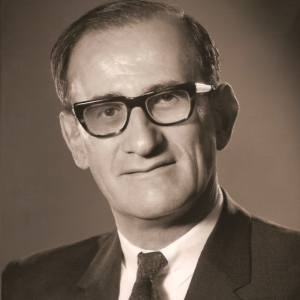 Heinz Warschauer was born in 1913 in Berlin, Germany and educated in public school and university there. He studied under Rabbi Leo Baeck and was a leader of the German Jewish Youth Movement of Berlin. Political journalism and teaching interested him all his life. In 1938, following Kristallnacht, he was interned in Buchenwald concentration camp. In 1939, he managed to get to England, and from there to Canada in 1940. Ironically, he was sent to an internment camp in Sherbrooke, Quebec as a German enemy alien.
Heinz Warschauer was born in 1913 in Berlin, Germany and educated in public school and university there. He studied under Rabbi Leo Baeck and was a leader of the German Jewish Youth Movement of Berlin. Political journalism and teaching interested him all his life. In 1938, following Kristallnacht, he was interned in Buchenwald concentration camp. In 1939, he managed to get to England, and from there to Canada in 1940. Ironically, he was sent to an internment camp in Sherbrooke, Quebec as a German enemy alien.